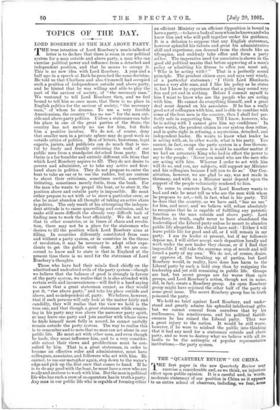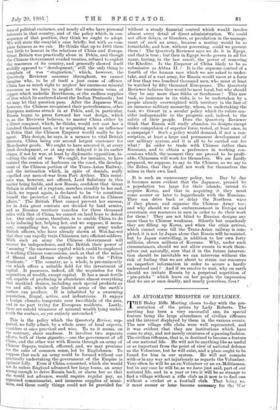THE "QUARTERLY REVIEW" ON CHINA.
ra 'SHE first paper in the new Quarterly Review may _L exercise a considerable and, as we think, an injurious effect upon public opinion. It is a careful and, in words, moderate statement of our position in China as it appears to an entire school of observers, including, we fear, some men of political eminence, and. nearly all who have personal interests in that country, and of the policy which, an con- sequence of that position, they think we ought to adopt. We will state the essayist's case briefly, but with as com- plete fairness as we can. He thinks that up to 1895 there was little to lament in the relations of China and Europe. Great Britain was practically alone in Pekin, and though the Chinese Government evaded treaties, refused to exploit the resources of its country, and generally showed itself stolidly opposed to "development," still the only thing to complain of was "stagnation," " which, however, the Quarterly Reviewer assumes throughout, we cannot imagine why, to be of itself a just cause of offence. China has as much right to neglect her enormous mineral resources as we have to neglect the enormous veins of copper which underlie Beerbhoom, or the endless supplies of iron which lie scattered about the Indian Peninsula; but we may let that question pass. After the Japanese War, however, the Chinese recognised. their powerlessness, other European nations struck in at Pekin, and, in particular, Russia began to press forward her vast design, which is, as the Reviewer believes, to master China either by a direct conquest, which, he thinks, would not cost her a hundred. thousand men, or by acquiring such an influence in Pekin that the Chinese Emperor would really be her agent. This design, he says, is a menace to vital British interests, China being our second largest customer for Manchester goods. We ought to have arrested it, at every fresh development, or at• any rate delayed it in its earlier stages, if not by war, at least by diplomatic opposition, in- volving the risk of war. We ought, for instance, to have resisted the cession of harbours on the coast, the develop- ment of the Chinese portion of the Trans-Asian Railway, and the intimation which, in spite of denials, really expelled our men-of-war from Port Arthur. This resist- ance was, however, not offered, Lord Salisbury in this matter being feeble, and now Russia, confident that Great Britain is afraid of a rupture, marches steadily to her end, which, we repeat again, is declared. to be "to constitute herself the protector of China and. dictator in Chinese affairs." The British Fleet cannot prevent her success, for in Asia great contests are decided by land. armies, and as Russian territory marches for three thousand miles with that of China, we cannot on land hope to defeat her. Our only course, therefore, is to enable China to do so by inducing her, helping her, and we suppose, if neces- sary, compelling her, to organise a great army under British officers, who have already shown at Wei-hai-wei that they can rapidly train Chinamen into efficient soldiers. With such an army the Chinese Government will recover its independence, and the British their power of " securino. " the enormous capital which could be employed. in working Chinese concessions, such as that of the mines of Shansi and Ronan already made to the "Pekin Syndicate." "The country, as a whole, is .pre-eminently one which offers a suitable field. for the investment of capital. It possesses, indeed., all the requisites for the acquisition of wealth, except capital. It has a most fertile soil, capable of producing in abundance almost everything that mankind desires, including such special products as tea and silk, which only limited. areas of the earth's surface can produce. It is inhabited. by a swarming population, frugal, active, and industrious. It enjoys a benign climate, temperate over two-thirds of the area, and in no part trying for European residents. Lastly, there are untold treasures of mineral wealth lying under- neath the surface, as yet entirely untouched."
This is the policy which the Quarterly Review, sup- ported, we fully admit, by a whole army of local experts, considers at once practical and wise. To us it seems, on the contrary, sheer madness. It involves two separate efforts, both of them gigantic,—one the government of all China, and. the other war with Russia through an army of Chinese Sepoys, trained, officered, and, we may presume for the sake of common sense, led by Englishmen. To suppose that such an army could. be formed without our Practically undertaking the government of the Empire is Optimist folly. Even if China consented, which she would not do unless England. advanced. her large loans, an army strong enough to drive Russia back, or alarm her so that she would not advance, would require regular pay, an °rganised commissariat, and immense supplies of muni- tions, and those costly things could not be provided for without a steady financial control which would involve almost every detail of direct administration. We could not allow delays, or blunders, or peculation in the manage- ment of such an army, because a mutiny would be so formidable, and how, without governing, could we prevent them ? The Quarterly Reviewer says we do it in Egypt, and that is true ; but then in Egypt we do govern in all but name, having, in the last resort, the power of removing the Khedive. Is the Emperor of China likely to be as submissive as Abbas II.? It is the supreme control of a fourth of the human race which we are asked. to under- take, and of a vast army, for Russia would sneer at a force of less than two hundred thousand men, who must at least be watched. by fifty thousand Europeans. The Quarterly Reviewer believes they would be most loyal, but why should they be any more than Sikhs or Soudanese ? This new task, so immense in its risks, is to be undertaken by a people already overweighted with territory in the face of an immense military monarchy, whom, in undertaking the task, we thwart in a secular policy which its rulers con- sider indispensable to the progress and, indeed, to the safety of their people. Does the Quarterly Reviewer think that Russia will really• abandon its designs except under compulsion of superior force, tested, at least once, in a campaign ? Such a policy would demand, if not a con- scription, at least a large and permanent development of our military system, and. it is all to be carried out for what? In order to trade with Chinese rather than Russians, and. to obtain a preference in working con- cessions which, the moment they are proved to be profit- able, Chinamen will work for themselves. We are hardly prepared, we suppose, to say to the Chinese, as we say to the Zulus, that they shall not work for themselves the mines in their own land.
It is such an unnecessary policy, too. Day by day it becomes more evident that the Japanese, pressed by a population too large for their islands, intend to acquire Korea, and that in acquiring it they must come sooner or later to loggerheads with the Russians. They can drive back or delay the Northern wave if they please, and. organise the Chinese Army too; and why should we risk embarrassment in Europe and overstrain our resources in men in order to do their work for them ? They are not blind. to Russian designs any more than to Chinese weakness. Silently but ceaselessly they are filling up Korea, and when the crisis arrives, which cannot come till the Trans-Asian railway is com- pleted, it is not by Japan alone that Russia will be resisted, but by Japan controlling, in addition to her own forty millions, eleven millions of Koreans. Why, under such circumstances, should. we not allow events to work them- selves out naturally, sure that if in the future interven- tion should. be inevitable we can intervene without the risk of feeling that we are about to strain our resources on imperfect information in order to secure a hardly understood end ? And if we resolve to wait, why on earth should we irritate Russia by a perpetual repetition of " pin-pricks " which leave on her people the impression that we are at once deadly, and nearly powerless, foes ?



































 Previous page
Previous page